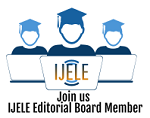*corresponding author
AbstractSome decades ago, Algeria began a transformation from a planned economy to a market economy, for which English became a requirement. The Algerian government believes that promoting English language learning is an attempt to become competitive globally. This emphasis on English resulted in various curricular reforms, influenced by the economic globalization, as the nation attempted to shape its educational systems to provide the skills for a growing global economy. Through this contribution, we believe that contributors have to rethink the role of English in education, employment, social status, and financial development. Moreover, in pedagogy, it is better to shift from ESP to teaching TEGCOM (Teaching English for Globalized Communication), allowing interaction between global forces in specific socio-cultural contexts. Therefore, in working together, the Algerian contributors can prove their English ownership and exercise their agency in their different market creative practices.
KeywordsPlanned economy to market; Teaching and learning English; English for Globalized communication; English teaching and learning betterment
|
DOIhttps://doi.org/10.31763/ijele.v3i1.100 |
Article metrics10.31763/ijele.v3i1.100 Abstract views : 3218 | PDF views : 1716 |
Cite |
Full Text Download Download
|
References
[1] K. Sung and R. Pederson, Eds., Critical ELT Practices in Asia. Rotterdam: SensePublishers, 2012, doi: 10.1007/978-94-6091-797-4.
[2] Y. Guo and G. Beckett, “A Critical Analysis of English Language Teaching in Today’s Market Economy in China,†in Critical ELT Practices in Asia, Rotterdam: SensePublishers, 2012, pp. 55–70, doi: 10.1007/978-94-6091-797-4_3.
[3] M. Castells, “The rise of the network society Blackwell,†Cambridge, Mass, 1996, available at: Google Scholar.
[4] T. Bui, T. T. T. Nguyen, and A. D. Nguyen, “Vietnamese higher education language planning and university students’ career development,†in English Tertiary Education in Vietnam, Routledge, 2018, pp. 54–67, doi: 10.4324/9781315212098-5.
[5] T. T. N. Bui and H. T. M. Nguyen, “Standardizing english for educational and socio-economic betterment-a critical analysis of english language policy reforms in Vietnam,†in English language education policy in Asia, Springer, 2016, pp. 363–388, doi: 10.1007/978-3-319-22464-0_17.
[6] H. HEMCHE-BEREKSI REGUIG, “A Comparative Study of Teaching ESP in the LMD System in Algerian and French Universities: The Case of the Faculties of Sciences in Tlemcen and Paris-Sud Universities.†2015, available at: Google Scholar.
[7] D. Graddol, “The Future of English?’The British Council.†London, 2000, available at: Google Scholar.
[8] J. J. Arnett, “The psychology of globalization.,†Am. Psychol., vol. 57, no. 10, p. 774, 2002, doi: 10.1037/0003-066X.57.10.774.
[9] W. Rennen and P. Martens, “The globalisation timeline,†Integr. Assess., vol. 4, no. 3, pp. 137–144, 2003, doi: 10.1076/iaij.4.3.137.23768.
[10] R. Robertson and K. E. White, “Globalization: Critical Concepts in Sociology. 6 vols,†London New York Routledge, 2003, available at: Google Scholar.
[11] J. Sun, J. Zeng, and N. M. Litchinitser, “Twisting light with hyperbolic metamaterials,†Opt. Express, vol. 21, no. 12, pp. 14975–14981, 2013, doi: 10.1364/OE.21.014975.
[12] G. Dines and J. M. Humez, Gender, race, and class in media: A text-reader. Sage, 2003, available at: Google Scholar.
[13] R. Phillipson, “Realities and Myths of Linguistic Imperialism,†J. Multiling. Multicult. Dev., vol. 18, no. 3, pp. 238–248, Jun. 1997, doi: 10.1080/01434639708666317, doi: 10.1080/01434639708666317.
[14] R. Phillipson, “Linguistic imperialism: African perspectives,†ELT J., vol. 50, no. 2, pp. 160–167, Apr. 1996, doi: 10.1093/elt/50.2.160, doi: 10.1093/elt/50.2.160.
[15] D. Block, “Political economy in applied linguistics research,†Lang. Teach., vol. 50, no. 1, pp. 32–64, 2017, doi: 10.1017/S0261444816000288.
[16] D. Block, “The structure and agency dilemma in identity and intercultural communication research,†Lang. Intercult. Commun., vol. 13, no. 2, pp. 126–147, 2013, doi: 10.1080/14708477.2013.770863.
[17] C. H. Lin, M. Warschauer, and R. Blake, “Language learning through social networks: Perceptions and reality,†Lang. Learn. Technol., vol. 20, no. 1, pp. 124–147, 2016, doi: 10.1037/t64110-000.
[18] M.-C. Ho, “English language teaching in Taiwan: a study of the effects of teaching culture on motivation and identity.†Durham University, 1997, available at: Google Scholar.
[19] A. Pennycook and J. W. Tollefson, English in the world/the world in English. 1995, available at: Google Scholar.
[20] N. Fairclough, “Global capitalism and critical awareness of language,†Lang. Aware., vol. 8, no. 2, pp. 71–83, 1999, doi: 10.1080/09658419908667119.
[21] F. Grin, “Economic considerations in language policy,†An Introd. to Lang. policy Theory method, pp. 77–94, 2006, available at: Google Scholar.
[22] F. Grin, F. Vaillancourt, and F. Vaillancourt, “The cost-effectiveness evaluation of minority language policies: Case studies on Wales, Ireland and the Basque Country,†1999, avaolable at: Google Scholar.
[23] F. Grin and B. Korth, “On the reciprocal influence of language politics and language education: The case of English in Switzerland,†Lang. Policy, vol. 4, no. 1, pp. 67–85, 2005, doi: 10.1007/s10993-004-6565-3.
[24] C. D. Jerald, “Defining a 21st century education,†Cent. Public Educ., vol. 16, 2009, available at: Google Scholar.
[25] K. Alshare and M. F. Sewailem, “A GAP ANALYSIS OF BUSINESS STUDENTS’SKILLS IN THE 21st CENTURY: A CASE STUDY OF QATAR,†Acad. Educ. Leadersh. J., vol. 22, no. 1, pp. 1–22, 2018, available at: Google Scholar.
[26] R. D. Freeze, K. A. Alshare, P. L. Lane, and H. J. Wen, “IS success model in e-learning context based on students’ perceptions,†J. Inf. Syst. Educ., vol. 21, no. 2, pp. 173–184, 2010, available at: Google Scholar.
[27] M. A. Badri, H. Selim, K. Alshare, E. E. Grandon, H. Younis, and M. Abdulla, “The Baldrige education criteria for performance excellence framework,†Int. J. Qual. Reliab. Manag., 2006, available at: Google Scholar.
Refbacks
- There are currently no refbacks.
Copyright (c) 2021 Salima Maouche

This work is licensed under a Creative Commons Attribution-ShareAlike 4.0 International License.

International Journal of Education and Learning
ISSNÂ 2684-9240
Published by Association for Scientific Computing Electronics and Engineering (ASCEE)
W : http://pubs2.ascee.org/index.php/ijele
E : zalik@ascee.org

This work is licensed under a Creative Commons Attribution-ShareAlike 4.0 International License.





















